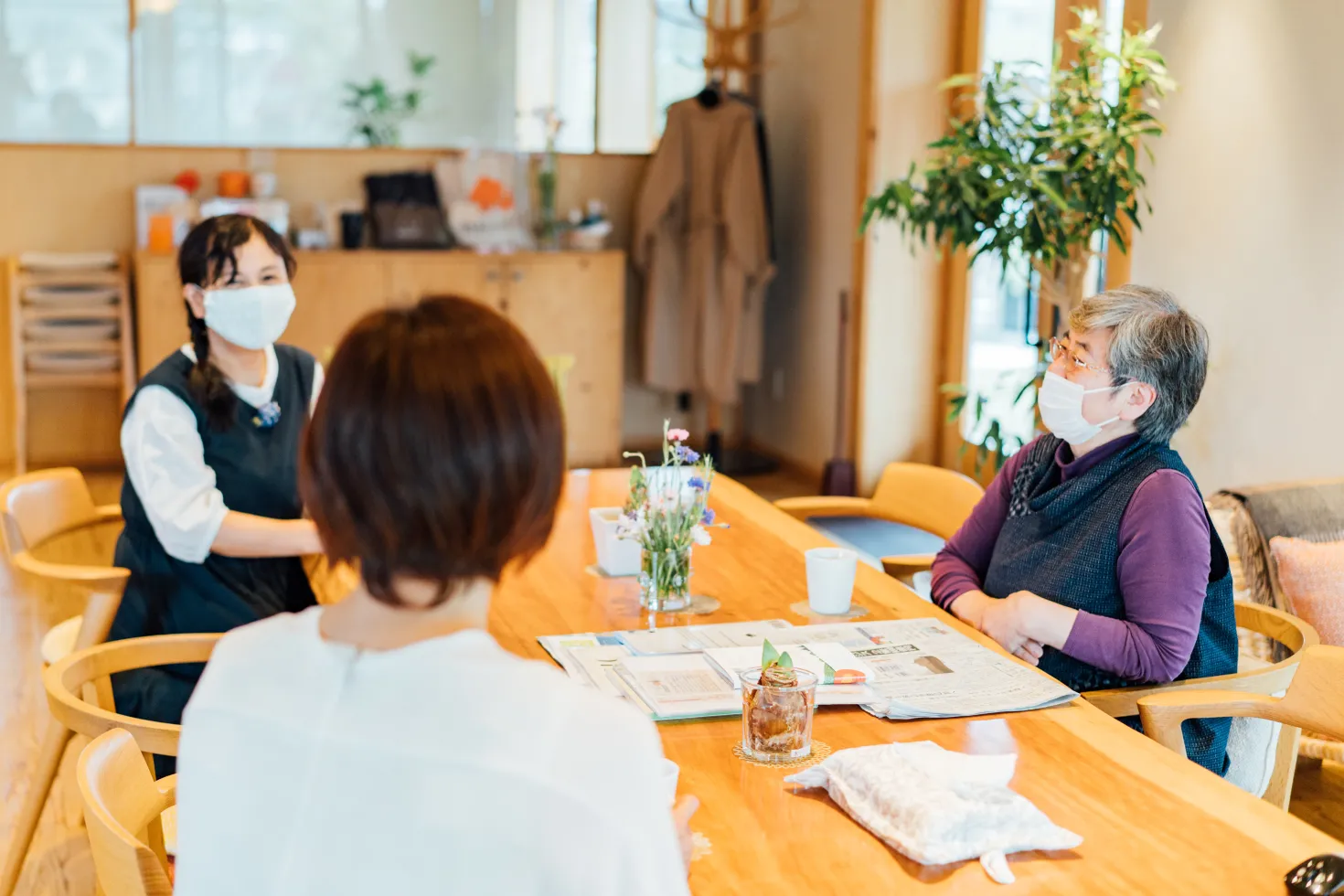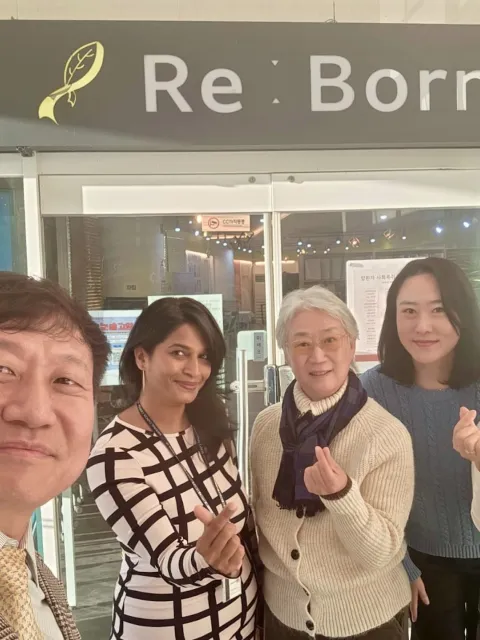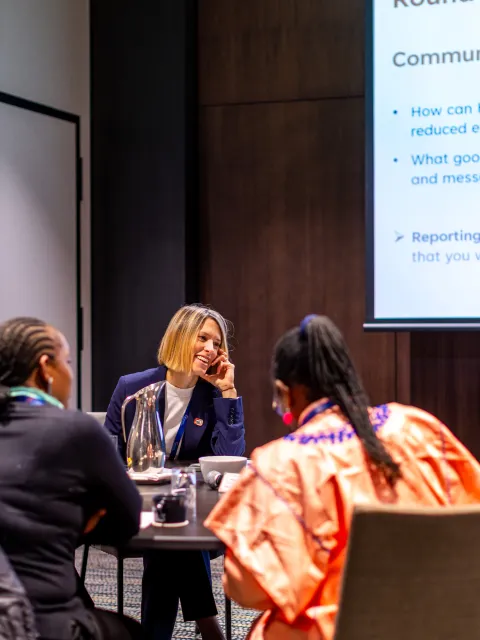Shaping cancer care around people: lessons from Maggie’s Tokyo
Masako Akiyama and Andrew Anderson of UICC members Maggie’s Tokyo and Maggie’s in the UK discuss how emotionally supportive spaces, such as those created by Maggie’s, are helping shift cancer care in Japan to a people-centred approach, empowering individuals to be heard, informed, and involved.

In a culture where people are often hesitant to share personal concerns, Maggie’s Tokyo offers a welcoming, non-clinical space for anyone to connect with cancer support specialists and others in similar situations. Group sessions and thoughtful building design encourage both open exchange and quiet reflection.
HIGHLIGHTS
- Maggie’s Tokyo, inspired by a UK model, provides a welcoming, non-clinical space for people affected by cancer to receive psychological support, practical advice, and connection.
- Co-founded by Masako Akiyama, the centre responds to a cultural context where people living with cancer often feel difficult to share their fears and emotions or ask questions.
- The building encourages open conversation and quiet reflection, with staff including cancer support specialist nurses, psychologists, and trained volunteers, many of them with lived experience of cancer.
- Its success is influencing healthcare professionals and policymakers in Japan, highlighting the need to integrate emotional wellbeing into mainstream cancer care.
As a nurse visiting people with cancer in their homes across Tokyo, Masako Akiyama saw the limits of what hospitals could offer once treatment was over. While advances in detection and therapy were helping more people live longer, families often felt they had little understanding of what to expect next.
“Many people thought they should just follow what the doctor recommended,” she said in a recent conversation with UICC. “They didn’t know what questions to ask and had no place to talk openly about what cancer would mean for their lives.”
In 2008, Masako Akiyama met Andrew Anderson, a senior leader at Maggie’s in the UK, a UICC member, who was in Japan to present the UK model of Maggie’s centres, which provide psychological, social support, and information on cancer in spaces designed for open conversation.
Speaking in the same conversation with UICC, Anderson, who is now Induction and Development Lead at Maggie’s, recalled how strongly the idea resonated with Akiyama. “She immediately saw the connection. She recognised the same needs among the families she was visiting in Tokyo – people wanting to talk, to understand, to feel less alone.”
Over the following years, Akiyama worked to build awareness of the approach in Japan, speaking with clinicians and institutions and laying the foundations for a centre that could respond to these unmet needs. Anderson recalled how significant that process was. “It’s never easy to transplant an idea from one health system to another,” he said. “Masako had to explain not only the concept but why it mattered, and to bring others with her.” Eight years later, she established Maggie’s Tokyo, also a UICC member.
Maggie’s centres are born of the experience of Maggie Keswick Jencks, a Scottish writer, artist and garden designer who was first diagnosed with breast cancer at the age of 47. Five years after this initial diagnosis and a successful first round of treatment, she learned in May 1993 that the disease had returned, and was given only a few months to live.
Sitting with her husband Charles in a hospital corridor, they were forced to process alone the news and its implications for him and their two children. They began talking about the need for a place close to, but apart from, the hospital. She imagined a calm and welcoming environment where people with cancer could receive information, psychological support, and practical guidance as part of their care. Over the following 18 months, she worked with her medical team and her husband to shape that vision. Maggie died in July 1995, but the first Maggie’s centre opened in Edinburgh the following year.
“Maggie knew what it was like to live with a diagnosis and to need something more than treatment alone,” said Anderson, who has worked for Maggie’s for over 25 years. “She wanted people to be able to walk into a place, talk to a professional, or simply sit quietly and feel safe.”
“Of course survival is vital,” Akiyama said. “But we also need to ask: how are people living during and after treatment? Are their families supported? Do they have the information they need? That is part of good cancer care.”
People shaping care delivery
Bringing this model to Japan meant adapting it to a cultural and healthcare environment where deference to medical authority remains strong. Akiyama explained: “Cancer affects your work, your family, your future. You need to be able to ask questions and say what you are afraid of. But in Japan, people are often hesitant to raise personal concerns with doctors. They often think it is selfish to take up more of the doctor’s time,” she said.
She added that even within the family, people remained silent. “At home, family members feel they have to be strong for each other, so they don’t speak openly there either. When they have doubts or worries, they keep them inside. As a result, people carry their fears alone.”
Maggie’s Tokyo was designed to change that dynamic. That did not happen immediately, however. “At first, it was unusual for people in Japan to come into a place and talk openly about very personal matters,” Anderson said. “But once they saw others doing so, it made sense, and they realised they could as well.”
Anyone can walk in without an appointment to meet with cancer support specialists, psychologists, and trained volunteers. Group sessions create opportunities to connect with others in similar situations, while the design of the building – filled with natural light, an open kitchen, and quiet corners – encourages both exchange and reflection. “When people come here, they often say this is the first time they have spoken about how they really feel,” Akiyama noted. “They realise they are not alone.”
The centre has also begun to shift how health professionals view cancer care. Doctors and nurses visiting Maggie’s Tokyo see people expressing thoughts and fears they had not shared in hospital. “It shows that care is not only about giving treatment but also about hearing people’s concerns,” said Akiyama.
Anderson said that this kind of influence echoed what happened when Maggie’s first opened in the UK. “At the beginning, clinicians in Britain weren’t sure what to make of it either. But they saw patients returning from the centres more confident, more prepared to discuss their treatment. Over time, doctors began to see the value of a place where people could take in information and talk about their fears.”
Over the past decade, Maggie’s Tokyo has shown how supportive care can complement treatment. “When doctors visit the centre, they see people expressing emotions and concerns they hadn’t shared in hospital. This shows them care is not only about treatment but about listening. It changes how they think about what good cancer care means,” Akiyama said.
The people who use Maggie’s Tokyo have also helped shape its activities. Visitors suggest topics for workshops, raise issues for discussion, and many continue as volunteers once their own treatment ends. “People want to give back,” said Akiyama. “They know what it feels like, and they want to help others not to feel alone.”
This participatory approach reflects the founding ethos of Maggie’s: People living with cancer are not passive recipients of care but active participants in shaping it. That principle has also reached beyond hospitals. Officials from the Ministry of Health have visited the centre, and discussions have begun on how its approach can inform wider cancer policy.
For Akiyama, this is crucial to ensuring supportive care is recognised as a core part of cancer services, not an optional extra. “Cancer care in Japan is changing. We are moving from a system where people stayed silent to one where they are beginning to speak. I am proud Maggie’s is part of that change.”
Last update
Thursday 18 September 2025
